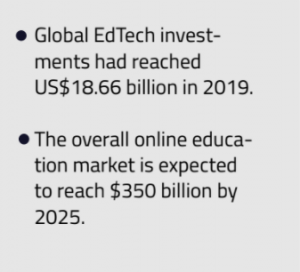Covid-19 impact on education
Since March 2020, about 1.3 billion children across 186 different countries are affected by school closures as a result of the coronavirus pandemic. This sudden shift away from the

classroom in many parts of the world is making people wonder whether they will have to adapt to online learning even after the pandemic, and how such a paradigm impacts the global education industry.
Even before Covid-19 hit us, the education technology industry was already growing at a fast pace with many people across the world adopting to EdTech.
Whether we are referring to language apps, video conferencing tools, virtual tutoring, online learning software, or cross-subject learning platforms such as MeiXter, EdTech usage has significantly surged since lockdown began.
This pandemic has indeed disrupted an education system that many regarded as losing its relevance already.
| Maybe the shift to online learning is the facilitator to create a whole new and more effective methodology for teaching students? |
Some are wondering if the hasty transition to online learning may have come in the way of this goal, but others are planning to adapt to this ‘new normal’ after experiencing the benefits of online learning first hand.
When students learn how to put away distractions of the internet and other disturbances associated with a remote learning environment to concentrate on their lessons, they can make a big favourable impact on their learning. While the education industry has been massively affected in both the short and long term due to the pandemic, there will be certain changes in the structure of education, and re-jig of some sorts will definitely be needed.

Is learning online as effective?
If you have access to the right technology, evidence suggests that online learning can be more effective in a few ways.
| Students retain 25-60% more material with online learning as compared to 8-1% in an actual classroom. |
| E-learning requires 40-60% less time to grab rather than a traditional classroom |
This is because students can learn at their own pace, going back and re-reading, skipping, or skimming through concepts as required.
What’s in store for the future?
According to Statista reports, in 2012, 25.9% of students have taken distance learning courses and this figure rose to 35.3% in 2018. This information shows that remote/online learning is slowly paving its way into the future, and has rapidly grown in today’s locked-down and socially distanced world.
While some believe that the rapid transaction to online learning may result poorly due to its lack of planning, others believe that a new hybrid model of education technology will emerge. This blended learning approach will combine the best of both worlds – offline and online, to offer students powerful learning experiences. Here are some unique benefits of this hybrid or blended education technique, which are not otherwise seen with the traditional classroom learning approach:
- Every student can get personal attention and continuous supervision from their teachers.
- Because of the flexibility of attending classes from their homes, attendance will be higher.
- By using Artificial Intelligence, learning can be customized to suit every child’s needs, which will eventually lead to better learning outcomes.
- By maintaining high levels of motivation and discipline, students can ensure they are making significant personal progress. Gradually, the student will be able to move to a self-directed learning style, which will be very effective in the long run for higher studies.
How is MeiXter responding to future EdTech?
MeiXter is an online web and mobile-based learning platform. Similar to any virtual tutoring marketplace, MeiXter encourages tutors and others who possess skills to share their knowledge on this platform. This technique of people on the same level teaching each other what they know has proved to be cost-effective in terms of training and development amongst popular companies such as British Telecom.
MeiXter’s skill-sharing platform is effective because learners are sharing similar experiences which in turn have significant benefits. People are more comfortable in resorting to learning platforms such as MeiXter as compared to traditional training that relies on authoritative figures. When an outsider is replaced with someone whom the audience can connect with, learners are in a much better receptive mode.
For example, employees or managers at the same level of the hierarchy can address day-to-day issues much better than any consultant or trainer can. This level of insight is wonderful for learners. The shared experience builds a connection between users, based on trust and respect.
In addition to learners, teachers also benefit from the MeiXter platform.
|
Teachers can both reinforce their knowledge while gaining insight from learners who are not familiar with the topic.
So as you can see, MeiXter proves to be a win-win for everyone.
The scale of the MeiXter’s skill-sharing learning platform is vast because it includes multiple segments such as industry-specific education, higher education, professional education, vocational education, and many others. Moreover, mobile-friendly online learning is continuously growing, and considering that a smartphone is a tool where the majority of our modern life takes place, MeiXter hopes to take advantage of this growth.

How MeiXter can benefit the education industry
- Promotes and sanctions autonomous learning while also enhancing engagement.
- Participants experience a smoother transition into higher education with more academic confidence.
- Students, tutors and others in the community can build strong partnerships.
- Manage student expectations, support workload, and encourage cross-cultural integration.
- Users (Tutors and learners) obtain strategic high-level support and central coordination, structure, and organization enhancing success and sustainability.
- Tutors can improve their personal and professional skills, increase their knowledge on the subject, better intercultural awareness, and also enhance employability skills.




